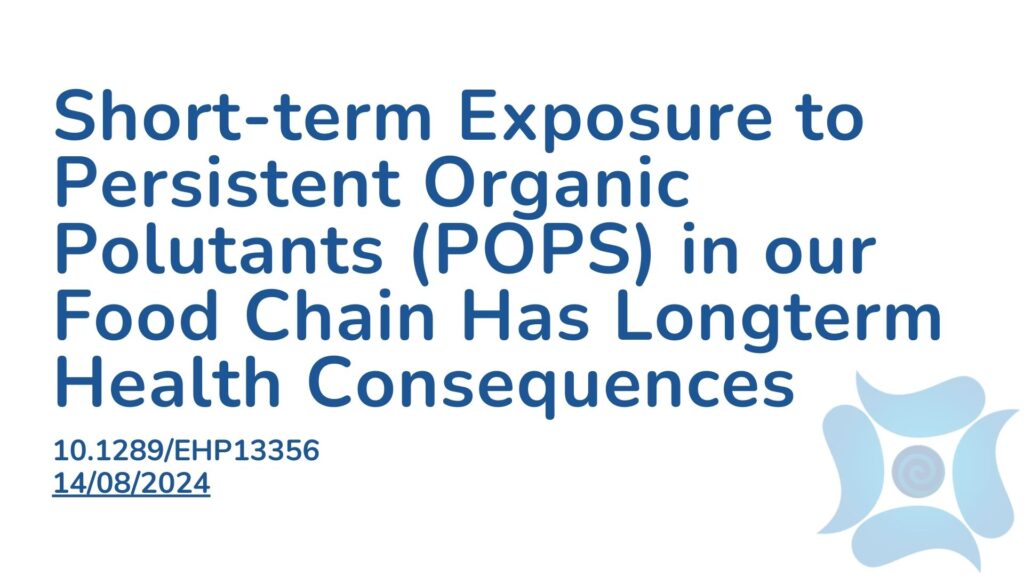Summary:
Persistent organic pollutants (POPs) pose a serious global health threat. Exposure to POPs is linked to various health issues, including cancer, neurological disorders, immune suppression, reproductive disorders, and metabolic diseases. 2,3,7,8-Tetrachlorodibenzofuran (TCDF) is a common POP that humans primarily encounter through high-fat foods such as meat, dairy products, and certain fish. Despite the significant health risks associated with POPs, especially from dietary sources, current scientific data is limited. Previous research in mice has shown that a 5-day exposure to TCDF in their food can quickly alter the gut microbiota and disrupt metabolism. Long-term exposure to TCDF (14 weeks) has been linked to liver complications. While POPs are known to have immediate and profound effects on health, their long-term consequences after being eliminated from the body remain unclear. Previous studies have indicated that POPs not only alter bacterial physiology but also significantly impact microbial metabolism and gene expression in vitro. Recent studies demonstrated that early-life exposure to a highly toxic PCB, another environmental pollutant, affects the microbiota in adulthood, regardless of diet. This suggests that microbial toxicity could be a key factor in the increased risk of metabolic disorders from early-life exposure to environmental pollutants. This study investigated the effects of early-life exposure to TCDF on gut microbiome composition and function, as well as on physiological and metabolic outcomes in mice. The results showed that TCDF-exposed mice had reduced abundances of beneficial microbes, decreased levels of short-chain fatty acids and indole-3-lactic acid, and lower concentrations of beneficial gut hormones. These findings indicate disruptions in gut microbiome community structure and function and provide strong evidence that even short-term exposure to POPs early in life can have lasting adverse effects on the microbiome, with potential health implications extending into later life.
Abstract:
Background: Exposure to persistent organic pollutants (POPs) and disruptions in the gastrointestinal microbiota have been positively correlated with a predisposition to factors such as obesity, metabolic syndrome, and type 2 diabetes; however, it is unclear how the microbiome contributes to this relationship.
Objective: This study aimed to explore the association between early life exposure to a potent aryl hydrocarbon receptor (AHR) agonist and persistent disruptions in the microbiota, leading to impaired metabolic homeostasis later in life.
Methods: This study used metagenomics, nuclear magnetic resonance (NMR)– and mass spectrometry (MS)–based metabolomics, and biochemical assays to analyze the gut microbiome composition and function, as well as the physiological and metabolic effects of early life exposure to 2,3,7,8-tetrachlorodibenzofuran (TCDF) in conventional, germ-free (GF), and Ahr-null mice. The impact of TCDF on Akkermansia muciniphila (A. muciniphila) in vitro was assessed using optical density (OD 600), flow cytometry, transcriptomics, and MS-based metabolomics.
Results: TCDF-exposed mice exhibited lower abundances of A. muciniphila, lower levels of cecal short-chain fatty acids (SCFAs) and indole-3-lactic acid (ILA), as well as lower levels of the gut hormones glucagon-like peptide 1 (GLP-1) and peptide YY (PYY), findings suggestive of disruption in the gut microbiome community structure and function. Importantly, microbial and metabolic phenotypes associated with early life POP exposure were transferable to GF recipients in the absence of POP carry-over. In addition, AHR-independent interactions between POPs and the microbiota were observed, and they were significantly associated with growth, physiology, gene expression, and metabolic activity outcomes of A. muciniphila, supporting suppressed activity along the ILA pathway.
Conclusions: These data obtained in a mouse model point to the complex effects of POPs on the host and microbiota, providing strong evidence that early life, short-term, and self-limiting POP exposure can adversely impact the microbiome, with effects persisting into later life with associated health implications.
Article Publication Date: 14/08/2024
DOI: 10.1289/EHP13356




